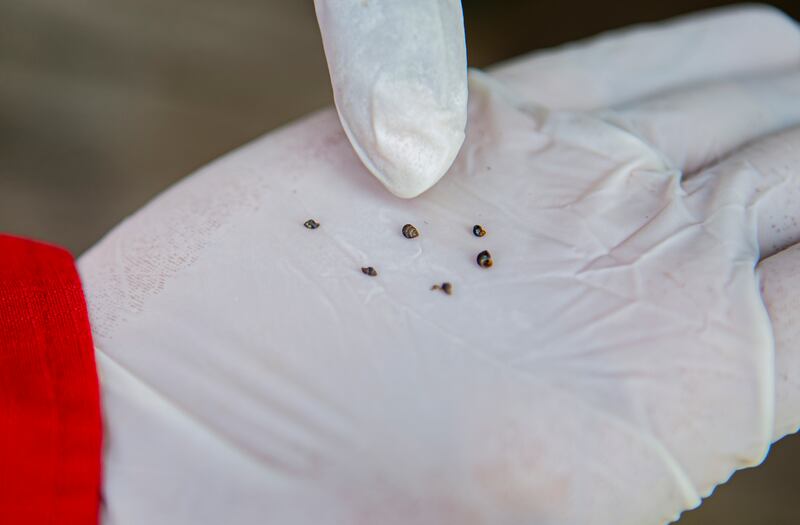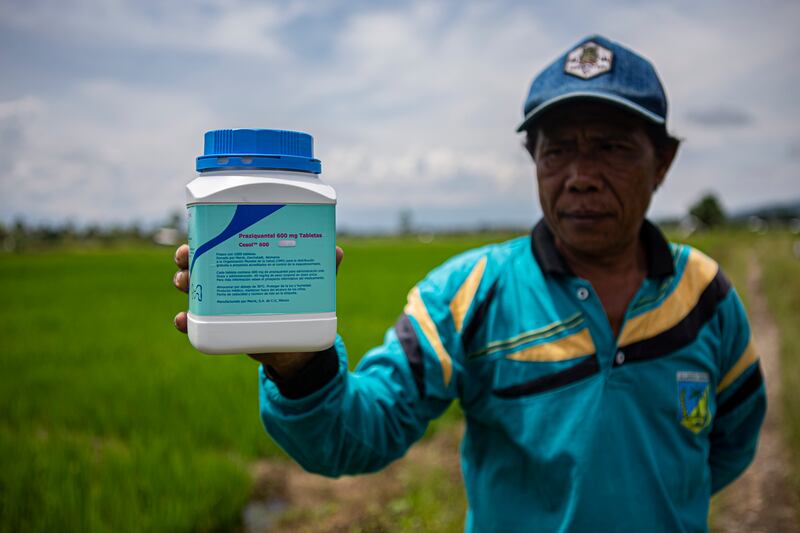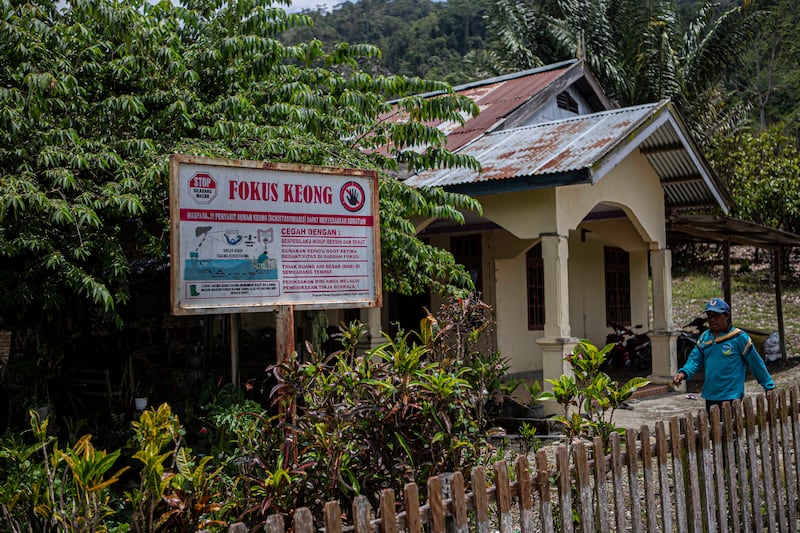Yairus Entaloke, a farmer in a remote area of Indonesia’s Central Sulawesi province, says he feels well enough to work in his rice field again after being stricken for a year with schistosomiasis, a disease also known as snail fever.
Yairus said he contracted it two years ago when he often went into the forest to set fish traps in small streams near his farm in Wuasa, a village in Poso regency. He didn’t show any symptoms until a year later, when he became weak and lost his appetite.
Schistosomiasis is brought on by parasitic worms that live in freshwater snails and can penetrate human skin. The disease can be fatal if left untreated.
Yairus visited a local health center several times but was only given vitamins because there was no supply of praziquantel, the drug used to treat schistosomiasis. He finally got the medicine last month after it arrived from the provincial health department.
“After I took the medicine, I felt better,” Yairus told BenarNews. “My body was fit and I could work again after a few days.”
But Yairus can still get infected again if he goes back to the areas where the snails are found.
“I hope that the government will eradicate the snails and prevent more people from getting sick,” he said.
In Indonesia, the disease has been endemic in Napu Valley, in Central Sulawesi, since it was first discovered in 1974 by researchers from Hasanuddin University in Makassar. Death rates are unknown, due to the chronic nature of the illness, officials said.
In Poso, about 60,000 people live in endemic areas, officials say. The government has been conducting mass drug administration campaigns since 1984 to reduce morbidity and transmission rates.
According to a study by Hasanuddin University in 2019, schistosomiasis caused an estimated U.S. $2.8 million in economic losses per year in Poso due to reduced rice production and increased health care costs.

However, challenges such as limited access to health services, environmental factors and social behavior have hampered efforts to eliminate schistosomiasis completely.
At the local level the disease is mainly transmitted through agricultural activities such as rice farming and fishing, said Rizanda Machmudin Yusuf Kandouwani, who heads the schistosomiasis control program at the Ministry of Health.
“People often go to the fields or rivers without wearing protective clothing or footwear,” he told BenarNews. “They also lack awareness and knowledge about schistosomiasis and its prevention.”
He added that environmental factors such as irrigation systems, dams and deforestation also contribute to the spread of snails and worms.
“The snails thrive in slow-moving water with aquatic plants,” he said. “They can also migrate to new areas through water channels or animals.”
People become infected when larval forms of the parasite – released by freshwater snails – break the skin during contact with contaminated water.
Schistosomiasis has been linked to poverty, malnutrition, reduced productivity and impaired cognitive development among children.
The disease can spread when people suffering from schistosomiasis contaminate freshwater sources with faeces or urine containing parasite eggs, which hatch in water.
The disease can cause itching, fever, diarrhea and weight loss. If untreated, it can persist for years and cause organ damage and cancer.

Kandouwani said that the government aimed to eliminate schistosomiasis as a public health problem by 2025 – meaning that fewer than 1% of people in endemic areas would show signs of infection.
To achieve this goal, he said, the government needs to intensify its efforts to provide praziquantel to all eligible people at least once a year, conduct regular surveillance and monitoring of infection rates, improve access to safe water and sanitation facilities, and educate people about hygiene and behavioral change.
He also called for more collaboration among local authorities, community leaders, health workers, researchers and international partners.
“We need a holistic and integrated approach to address schistosomiasis,” Kandouwani said. “It is not only a health issue but also a social and economic one.”

The study also found that schistosomiasis affected animal health and productivity, especially among cattle and buffalo.
Andi Nurul Hidayah Sari Dewi Nasution, a veterinarian and researcher at Hasanuddin University who oversaw the study, said animals became infected with schistosomiasis when they drank or grazed near contaminated water sources.
Infected animals showed symptoms such as weight loss, anemia, diarrhea and liver damage.
“They also had lower milk production and fertility rates,” she said. “Some of them died from severe complications.”

Animal schistosomiasis could pose a risk for human infection if people consume raw or undercooked meat or organs from infected animals, she said.
Andi recommended that animal owners deworm their animals regularly with praziquantel or other drugs approved by veterinarians.
She also suggested that animal owners should avoid letting their animals roam freely near endemic areas or use snail-infested water for irrigation or drinking purposes.
Andi urged more research on animal schistosomiasis in Indonesia to understand its epidemiology, impact and control measures.
“We need more data on animal schistosomiasis because it is often overlooked or underestimated,” she told BenarNews. “It is important to protect both human and animal health from this disease.”
